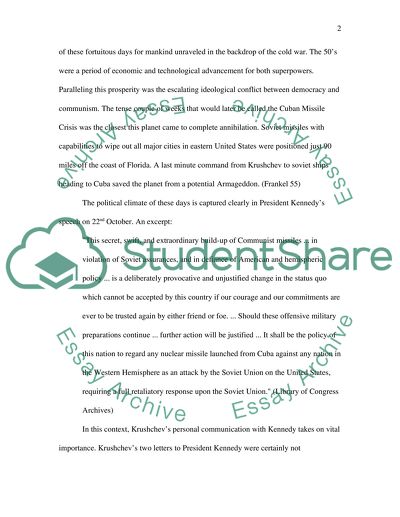Cite this document
(“Cuban Missile Crisis: Analysis and Relevance of Krushchev's Messages Essay”, n.d.)
Cuban Missile Crisis: Analysis and Relevance of Krushchev's Messages Essay. Retrieved from https://studentshare.org/miscellaneous/1536411-cuban-missile-crisis-analysis-and-relevance-of-krushchevs-messages-to-kennedy-and-the-outcome
Cuban Missile Crisis: Analysis and Relevance of Krushchev's Messages Essay. Retrieved from https://studentshare.org/miscellaneous/1536411-cuban-missile-crisis-analysis-and-relevance-of-krushchevs-messages-to-kennedy-and-the-outcome
(Cuban Missile Crisis: Analysis and Relevance of Krushchev'S Messages Essay)
Cuban Missile Crisis: Analysis and Relevance of Krushchev'S Messages Essay. https://studentshare.org/miscellaneous/1536411-cuban-missile-crisis-analysis-and-relevance-of-krushchevs-messages-to-kennedy-and-the-outcome.
Cuban Missile Crisis: Analysis and Relevance of Krushchev'S Messages Essay. https://studentshare.org/miscellaneous/1536411-cuban-missile-crisis-analysis-and-relevance-of-krushchevs-messages-to-kennedy-and-the-outcome.
“Cuban Missile Crisis: Analysis and Relevance of Krushchev'S Messages Essay”, n.d. https://studentshare.org/miscellaneous/1536411-cuban-missile-crisis-analysis-and-relevance-of-krushchevs-messages-to-kennedy-and-the-outcome.


